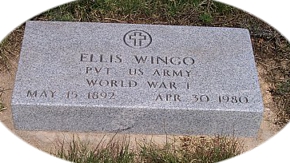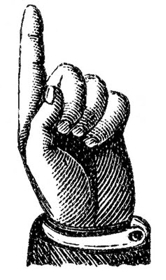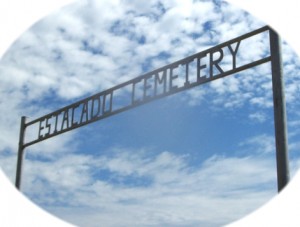I ran across this surname while walking through a prairie cemetery in Lubbock County, Texas:
 My curiosity was piqued to find out its origins.
My curiosity was piqued to find out its origins.
As always there will be more than one opinion as to a surname’s origin – here are three theories:
One source believes that the name was locational in Berkshire. Possible spelling variations were Wingrove, Winger, Wingrave and Winge. An early instance of the name “Witungraue” (no surname) was recorded in the 1086 Domesday Book, which would have derived from an Olde English word – wioig (a willow) and graf (a grove).
 Another source purports that the name was a variation of the following names: Winpenny, Wimpenny, Wimpory, Wimpery, Wimpeny, Wynngold and more. Yet another source, The Dictionary of American Names, indicates that the name is likely an Anglicized version of the French Huguenot name “Vigneau.” Their evidence for believing the surname is of French origin:
Another source purports that the name was a variation of the following names: Winpenny, Wimpenny, Wimpory, Wimpery, Wimpeny, Wynngold and more. Yet another source, The Dictionary of American Names, indicates that the name is likely an Anglicized version of the French Huguenot name “Vigneau.” Their evidence for believing the surname is of French origin:
A habitational name for someone from a place so named in Vienne, or from places in Aube and Indre called Les Vigneaux, or
A status name for the owner of a vineyard, from a derivative of Occitan vinhier “vineyard”. This is found as a Huguenot name.
The latter explanation actually seems more plausible after finding evidence offered by family historians who have found records of the Wingo surname appearing in or near Manakin, a Huguenot settlement in Virginia. According to The Huguenot Society of the Founders of Manakin in the Colony of Virginia web site, French Huguenots began arriving in Virginia as early as 1620. Like many early settlers, the Huguenots were fleeing religious persecution.
A quick check of census records for Ellis Wingo reveals that his grandparents were born in South Carolina. In 1679, King Charles II sent two shiploads of French Huguenots to South Carolina for the purpose of cultivating grapes, olives and silkworms. One family history researcher found evidence in a book called Irish Pedigrees or the Origin and Stem of the Irish Nation which lists the names of refugees who settled in Britain and Ireland during Louis XIV’s reign. Louis XIV’s persecution of Huguenots began in 1685 but the name Vigneau had already been found in England long before that. One name listed was “De Vinegoy”.
So it’s possible that Ellis Wingo’s ancestors may have been French Huguenots. This is what I love about history – just one glimpse of an unusual surname on a grave stone and a little research – a little “diggin’ history”. I don’t think I’ll ever run out of material! Look for more articles later from my visit to historic Estacado Cemetery.
 Did you enjoy this article? Yes? Check out Digging History Magazine. Since January 2018 new articles are published in a digital magazine (PDF) available by individual issue purchase or subscription (with three options). Most issues run between 70-85 pages, filled with articles of interest to history-lovers and genealogists — it’s all history, right? 🙂 No ads — just carefully-researched, well-written stories, complete with footnotes and sources.
Did you enjoy this article? Yes? Check out Digging History Magazine. Since January 2018 new articles are published in a digital magazine (PDF) available by individual issue purchase or subscription (with three options). Most issues run between 70-85 pages, filled with articles of interest to history-lovers and genealogists — it’s all history, right? 🙂 No ads — just carefully-researched, well-written stories, complete with footnotes and sources.
Want to know more or try out a free issue? You can download either (or both) of the January-February 2019 and March-April 2019 issues here: https://digging-history.com/free-samples/
Thanks for stopping by!

My maiden name is Wingo! As a youngster, my paternal grandfather and his folks moved from somewhere in Texas to Mississippi, which is where I live now. I love it when I come across anything about my name. It’s not a common one! Thanks for sharing this information.
Great … I’m so glad you enjoyed it and thanks for stopping by. I wrote a few articles on the Estacado Cemetery (Quakers in Texas and Dorothy Trimmer Bryant) — there was a Wingo buried there which inspired the Surname Saturday article.
Hello beautiful people
I have a friend that her maiden name is Wingo.
Doesn’t have much knowledge of ancestry and neither have I .lol
She’s 86 years old resides in Granbury Tx
She has relatives in Weatherford but dont think she knows about other Wingoes
I really like her and hope she can find relatives her email is [email protected]
Her name is Lou Spencer (Wingo)
her father was Charles Wingo
Her grandfather was Benjamin Wingo 1848-1938 born in Montgomery Al and deceased in Plainview Hale Tx
I been researching and found out there’s no info on who was John Wingo X 1630 England UK
Joanna, thanks for stopping by! Here’s a bit more information for your friend. According to his death certificate Benjamin Wingo was the son of W.C. Wingo and Elizabeth Wakefield. W.C. was enumerated as “Willie” or “Willis” in census records. Although the death certificate indicates his father was born in Alabama and his mother in South Carolina, census records indicate Willis was born in South Carolina as well.
My son is related to the Wingo’s through his father, unfortunately his father was adopted sometime between 1995-1997 (he was born Dec 1994) so we don’t know much about his family besides what little ancestry has connected. Still looking for his birth parents.
What is your son’s father name and where was he born? This might help zero in on which direct Wingo family line he descends from.
Remnants of the Tribes of Juda and Benjamin came first to Iberia, the Roman Name for what is now the Iberian Peninsula, which consist of Spain and Portugal.
My research on my family tree found that the first Wingo came to the USA about 1630 from England and settled in Amelia,County,Virginia.
Interesting! Thanks for sharing. I’m not sure how far my dad got with our family tree. It’s great to see more Wingo history!
Same here. Kenneth Wingo
Mine are from Amelia County too.
I have heard the same.
About 10 years ago I purchases a M1 Garand rifle and was also given the accompaning bayonet. The bayonet has the name L.E. Wingo, Jr printed on the sheeth. Rifle and bayonet were bought in El Paso, TX. Previous owner stated he aquired them from Phoenix AZ. Any info os greatly appreciated.
My maiden name is also Wingo (and I’ve kept it as my middle name). My dad’s people are mostly still in the Dallas/Fort Worth area. He and most of his eight siblings were born in Weatherford TX. As a kid I was told by more than one family member that the name is of Welsh origins but I’ve not yet done enough of the genealogy to verify it. Will be making a trip to Scotland and Wales next fall and hope to find out more while I’m there =D
Interesting! Good luck with your family history search. Thanks for stopping by!
Awesome! I wonder if we’re related… 🙂
I’m thinking a lot of us might be… there aren’t that many Wingos in the states =D
My husband’s mom was a Wingo. Her dad was from Texas. They know little about their family origin
I should put you in touch with one of the subscribers to my new digital magazine. Her maiden name is Wingo. FYI, the majority of this article has been pulled and will be included in a future issue of Digging History Magazine. Most of the content from this site has been pulled and some articles will later appear in future issues of the magazine.
Subscriptions are easy to purchase (3-month, 6-month and one-year): https://www.digginghistorymag.com/buy-a-subscription/
If you’d like to try an issue, email me at [email protected] and reference this comment — I’ll send you a free issue to try out. How’s that?
Just now getting interested in where my last name originates, I do know my dad and his side of the family originate in Virginia, I myself live in Tampa FL with 5 more brothers by wingo and we now have children. So I’m very interested on what I may find..lol.. sincerely JOSHUA D WINGO
Thanks for stopping by! Let me see if I can put you in contact with one of my magazine subscribers (Digging History is now a monthly digital magazine https://www.digginghistorymag.com/the-magazine/). Her maiden name was Wingo. Let me see what she says.
My Wingo relatives (William and Polly Wingo) started out in Richmond, VA (1790)—where there is a large Huguenot population and a Huguenot Society. They later moved to Ohio in the 1840s with their 11 children. There are many more Wingos in Ohio.
Thanks for stopping by! I should put you in touch with another Wingo whose been following the blog and now a subscriber to Digging History Magazine (the blog is now a digital magazine via subscription). Is it okay to give her your name and contact information?
Hi, my name is Fernn Jenkins. My greatGrandmother was a Wingo from Tennessee. Was always told she was of Cherokee descent.
My moms side of the family is Wingo’s. I carry both of my parents last names cause they fought over which. Whataya do. My grandfather was Darryl Z Wingo, and the Arnold Air Force base hotel is named after him – The Wingo Inn. – Manchester Tenneseee
Larry Wingo, 07/22/2021
Many Wingo’s descend from the Cherokee DNA line of Moytoy, a Cherokee DNA Test is now available from DNA Consultants of Longmont, CO which can help determine if a person has any Cherokee DNA, I have taken their Cherokee DNA Test and have all three of their reported Cherokee Markers.
Larry, thanks for stopping by! That’s very interesting information to know. I’ve never heard of this type of DNA testing (specific ethnicity). How far back can they trace? I have one client who is documented to have descended from Oconostota but his DNA (through Ancestry) doesn’t reveal an Native American DNA.
My last name is Wingo, my grandfather was 100% Cherokee, not sure where he was born, all I know of him was he lived in Texas where he married my grandmother and had my dad and uncle in texas, I think brazos county.
Joel, thanks for stopping by and sharing.
A lot of Wingo’s in Texas, if you had a first name it would help a lot, you maybe a descendant of Willis P Wingo of the Indian Nation?
07/22/2021
I also descend from Oconostota on my mothers line and Frances Rachel Moytoy on my fathers Wingo line.
07/22/2021
Sorry forgot to answer your other questions, I have traced my direct Wingo line back to the 1700’s in Amelia Co, VA, and to the mid to late 1600’s in Somerset Co, Maryland, as for your client you might try have them search Ancestry DNA for the name Brewer, Rebecca Narcessa Moytoy aka Rebecca Ann Smith married into the Brewer family, she is believed to be a daughter of Oconostota who had been identified over the period of his lifetime by several different names including The Great Warrior, The Warrior Of Chota, Cunne Shote (Stalking Turkey) and also as John Smith.
Hope this helps
My client’s connection to Oconostota comes through Lucy Ward. Their daughter Lucy Rebecca Au Noo Yo Hee Ward married John Chu-nau-wee Briant who had a son named John Bryant, his third great-grandfather.
07/22/2021
It’s not known for sure how many children or wives Oconostota had, however one source I have indicates a 3rd wife was Lucy Ward, a former lady-in-waiting for the Queen of England, she was adopted by the Cherokee and following Cherokee Clan Law her children would have had her name Ward.. My Cherokee Wingo’s from Russell and Tazewell Counties, VA, followed these Cherokee Clan Laws some what, my great great grandfather, John Wingo, had six sisters of whom three sisters either named some or all of their children Wingo, this has really confused some Wingo researchers who don’t understand Cherokee ways
I am interested in this topic.
YDNA says that the Hunts of Gosfield and Wingos in the US came from the same man around 1200 CE and that we are found in the heart of the Ashkenazi Jewish Y tree with a common ancestor of their High Priestly class at J-Z39057 until Wingo/Hunt and they split at about to J-Z39055 (P-244 for priestly) and we to J-Z28739 at about 750 BCE.
So it is interesting that other offered names are ” Winpenny, Wimpenny, Wimpory, Wimpery, Wimpeny, Wynngold and many more.” Certainly, the last one is interesting – and their is another French Jewish family Vingot which become Weingott.
Also the vinyard image is interesting since the early French Jews (like Rashi) were uniquely integrated, not in the current maternal structure of the Eastern European Jews and uniquely pastoral in their lifestyle as a strong contrast to the urban tendancies elsewhere.
So hope that it a bit of food for thought.
Now for us de Vere Hunts and the Wingo testors to see if we can stumble on a common point
Wingo,DNA Match location,, Island of Majorca Spain ” Spanish Jew”,& Iberian Peninsula Match, possible Jewish Hebrew trade name “Oseh Yayin”- Make Wine
Lloyd, thank you for stopping by and sharing your insights about the Wingo surname … food for thought indeed!
Hi Larry
Was this a Y or autosomal match? Would love to know more here or on the FTDNA site. It has to be the best lead yet !!
I have reviewed some of the evidence and in my mind there is zero Y DNA or other information to suggest that this Wingo or our Hunts were Anglo-Saxon as the article contends. In fact, if this were so, our trail from the Northern Kingdom of Israel where we match the completely strong Ashkenazi Jewish clade Z39055 (P244) would have many other representatives.
This was pointed out to me by those with considerable experience with J on other parts of the non or less Jewish areas. It is just too thin. There is zero chance that our common ancestor was Anglo-Saxon.
The additional edge is that based on STRs at least at 37, the Ukranian Jew who is a descendant of Moysey Dubov is closest to our families which eradicates Anglo-Saxon completely. Obviously should he do big Y sometime, then this would put everything to rest.
The problem with a lot of these pages is that they are designed to sell crests and a highly propositional.
https://www.houseofnames.com/wingo-family-crest#:~:text=The%20surname%20Wingo%20was%20first,and%20the%20Norman%20ambience%20prevailed.
So could any of it pertain to us. Only for those on whom they were completely wrong to attribute to Anglo-Saxon.
I would put all my money on the Yayin wine story because it fits remarkably with other facts
12/26/2022
Records of the Huguenot “Thorn Crown Chapel” in England may hold some answers to the “Winge-Wingoe-Wingo” saga. They did not suffer the hardships of sea travel to come to what is now America for their health! In my mind they were being persecuted.
The Huguenot Church on Threadneedle St., London, known as the French Church, founded in 1550, a central London Protestant community, stemming from the emigration of French and Flemish (Walloon) Protestants to England in the sixteenth century, the French Church had previously been St. Anthony’s Hospital Chapel. Primary occupation name; French ” Vigneron” which translates to English as “Wine Grower”, deviations found in British Isles church vestry records for the time period of 1631 to 1807 include Vigneau, Vignau, Vignaux and Vigno, anglicized English deviations found in British Isles for the time period of 1672 to 1845 include Winge, Wing, Wynge, Wingeau, Wingoe and Wingo, Early surname emigration to the British Colonies now the United States included Wynge, Winge, Whing, Whingo, Wingot,Wingar, Wingoe and Wingo. The Name “Wingo” originally appears to have been an early English slang word for Wine Grower.
Vienne is a brilliant glove/hand as we de Vere Hunts share their parent Haplogroup clade and the grandparents bring in Northern Israel of many current Ashkenazi Jewish families
From Jewish sources
VIENNE, town in the department of Isère, S.E. France. The earliest confirmed Jewish presence in France was in Vienne. In the year 6 C.E., *Archelaus, ethnarch of Judah, was consigned there by Emperor Augustus; he died there in about 16 C.E. This fact was probably the source of the error in the Roman provençal of Girard de Vienne, in which it is asserted that a Jew named Joachim arrived in Vienne after the conquest of Jerusalem by Titus. At the beginning of the ninth century there was an important Jewish community in Vienne that was confronted by the coercive missionary activities organized by *Agobard, bishop of Lyons. After Agobard’s failure, he induced the bishop of Vienne to call on his community to avoid all relations with the Jews. From 849 a plot of land inside the town was commonly owned by the Jews. This may have been the nucleus of the Jewish quarter, Burgus publicus Hebraeurum, which is mentioned from the last quarter of the tenth century and is commemorated by the “Saint-Pierre entre Juifs” parish and the Rue de Juiverie near the St.-Maurice church. From the tenth century the Jews of Vienne also owned and cultivated agricultural estates, including many vineyards within the proximity of Vienne. They constantly expanded these properties and the purchase of land by Jews was often camouflaged under a fictitious promissory note, for which a pledge in real estate was taken. Also, the Jews often exchanged plots of land, occasionally with the Church itself. At the close of the tenth century the Jew Astier was invested with the function of steward by the abbot of St.-André-le-Bas to deal with business (negotia monachorum). The tenor of the relationship with the Christian community changed radically in 1247, when the archbishop of Vienne had to be exhorted by Pope Innocent IV to guarantee the protection of the Jews of his diocese after the *Valréas blood libel. One of the last details known about the Jews of Vienne during the Middle Ages concerns the search carried out in 1389 to seize the promissory notes. Among the Jewish scholars of Vienne during the Middle Ages were the legal authority Tobiah b. Elijah (first half of the 13th century) and the posek Yakar (second half of the 13th century).
On the Huguenots front, the siege of Poitiers is right on the money.
Based on what we can see then is that the genetic split happened about 1000 -1100 CE with the Wingos likely becoming crypto-Jews as were a few other Hugenots and then eventually forced out, whereas the line of their brethren became manusims and ended up in Essex and then Ireland ( the bridge time is getting smaller)